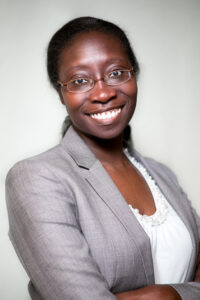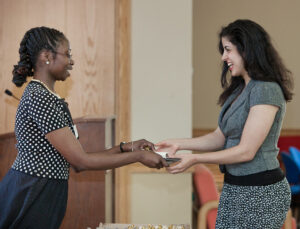Full Circle

Vivienne Felix ’03
By Heather Mayer Irvine
In 1999, Vivienne Felix ’03 went to college and never left. Well, she graduated from Lafayette College, pursued subsequent master’s degrees in management (2006) and education (2008), earned a doctorate in higher education administration (2016), and then went on to work in higher education all over the country.
In 2008, Felix returned to her alma mater, where she worked as the assistant director of the Annual Fund until 2011. Today she is associate director of experiential learning at New York University.
When Felix graduated from Lafayette, she knew she wanted to pursue a career in higher education; she wanted to enhance students’ experiences.
“I loved Lafayette as a student,” she says. “I felt I thrived.”
When an opportunity to join the Lafayette staff presented itself, it ended up being a good match, Felix says.
“It was a really easy transition for me,” Felix says. “And it gave me a totally new lens to view the campus.”
During her tenure on staff, Felix was approached to serve as the first campus liaison for the newly developed McDonogh Network. Her undergrad project, which looked at the campus experience of African American students in the 1960s and 1970s, made her a good fit for the position, she says.
“The network appealed to me as a person of color,” she says. “It created a great opportunity for Lafayette, to acknowledge the contributions of African American students and stay connected to the alumni database. It’s not just a group of alumni showcased during Black History Month.”
Felix emphasizes the importance of campus and alumni groups reflecting the diversity of the student body.
“These spaces provide places for people to celebrate their successes, talk about challenges, and network,” she says.

Vivienne Felix ’03, pictured during her time as assistant director of the Annual Fund, hands an award to Fairouz Foty ’11 during a McDonogh Network presentation in 2011.
Felix was away from Lafayette for only five years between graduation and her employment but noticed a significant change in the student body and the College’s road toward diversity. She saw more student activism, for example, as well as the creation of groups and clubs that went beyond “African American.”
“There was much less of a bubble than when I was an undergrad,” she says.
Felix goes on: “When I was a student there was a black student union. But what stood out to me as a professional [on campus] was alliances for Caribbean students [and from] particular nations in Africa … It was much less homogenous.”
In her work in higher education, Felix considers her own experience as a minority African American student. At NYU, she works behind the scenes to help students connect with career paths through meaningful internships and fieldwork. She knows that not all students can afford to take on unpaid work, even if it will help advance their careers over the long term.
“I’m pretty fortunate,” Felix says. “I worked really hard, and I had access to what [my parents] gave me.”
Felix was an EXCEL Scholar as an undergrad, which allowed her to travel abroad and take unpaid internship work. She notes without that support, she may not have been able to pursue certain opportunities.
“If you can’t offset costs, you’re creating equity and power dynamic issues,” she says.
Felix commends the work Lafayette is doing today in providing career opportunities for its students. As opposed to focusing heavily on developing lawyers and business professionals, for example, she says the school is embracing careers in the nonprofit sector too.
“Students are learning that they can thrive [in the nonprofit world], and it’s OK to build a career around civic good,” she says.
Felix uses her experience as a Lafayette student and staff member to enhance her work at NYU.
“I really appreciated the warmth of my Lafayette experience,” she says. “I felt like the faculty knew me, and that mattered. It made me want to finish my career at Lafayette as a student … I take that to my students.”
For example, Felix, whose job doesn’t include a lot of face time with students, makes an effort to attend student events.
“NYU is a predominantly white campus, and I want students [of color] to see there is someone who looks like them, whom they can speak to if they want. There are diverse people on staff.”